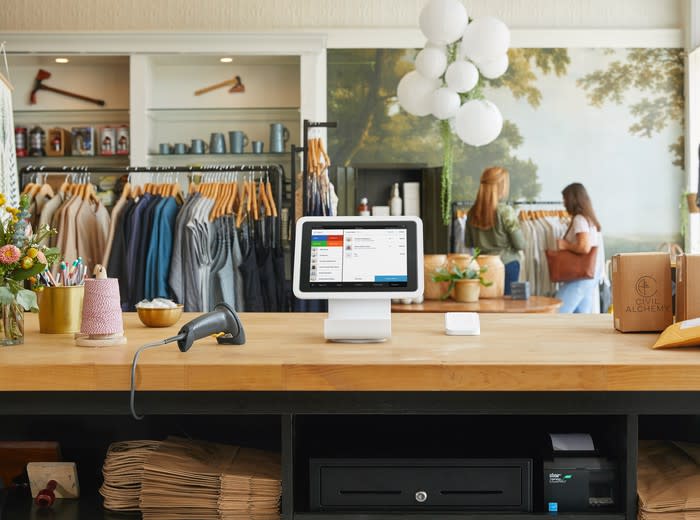Square Is Getting a Lot of Love From Analysts
After its public debut in late 2015, Square (NYSE: SQ) didn't take long to become something of a market darling. The stock price soared 670% in just three short years, as one of the top choices in the war on cash. Bears in the market eventually appeared and the stock lost nearly half its value to close out 2018, though shares have since regained some of those losses.
What caused the sell-off? A combination of insider stock sales and the departure of CFO Sarah Friar gave investors pause. More recently, stock prices for the company behind the eponymous Square card reader began to rebound, but then its second-quarter earnings report in late July put a damper on that. While the top and bottom lines in the report exceeded expectations, management's lackluster forecast sent the stock falling once again.
These days, a number of analysts are saying the selling is completely overdone and now is the time to buy Square.

Image source: Square.
Positive catalysts
In August, Square recently made the decision to sell its Caviar food-delivery service for $410 million -- significantly higher than the $44.3 million it reportedly paid for the business. This gets the company out of a highly competitive and low-margin market that wasn't part of its core payments space.
This week, MoffettNathanson analyst Lisa Ellis upgraded Square to buy from neutral (hold), in response to "a 24% sell-off in Square stock over the past four weeks." Ellis is also encouraged by the company's exit from what she describes as the "fiercely competitive food delivery market," allowing Square to dedicate resources to its core business. "The divestiture will free up investment dollars for Square to pour into its core seller and consumer businesses." Ellis also believes Square has a "viable long-term business model" by positioning the Cash App as an alternative to traditional checking accounts.
Also this week, SunTrust Robinson Humphrey analyst Andrew Jeffrey upgraded the stock to buy from hold, with an $80 price target, because Square is investing heavily in point-of-sale card readers geared toward "large, inventory-intensive retailers where we believe it currently competes poorly." Jeffrey went on to point out that the robust growth from larger businesses is "highly concentrated among a relatively small number of super-successful sellers," giving Square plenty of potential growth.
Jumping on the bandwagon
Late last month, Deutsche Bank analyst Bryan Keane pounded the table on Square, calling its "recent stock weakness ... a good buying opportunity. ... We don't believe there has been any change to the company's robust fundamentals and long-term outlook."
One potential driver is Square's Cash App. Investors may not fully appreciate the enormous potential from Square's consumer-facing business, which competes directly with PayPal (NASDAQ: PYPL) wunderkind Venmo. Square Cash has grown more quickly than many anticipated, and Keane believes it "should carry strong organic growth for the company over the next several years."

Image source: Square.
The devil's in the details
The sale of Caviar will allow Square to focus exclusively on the two factors that will drive its future growth -- its consumer-facing Cash App and the larger sellers fueling its payments empire.
On the company's second-quarter conference call, Square CEO Jack Dorsey pointed out, "In just three years, Cash App revenue grew from basically $0 to $135 million [this quarter], excluding bitcoin."
While small businesses accounted for the bulk of Square's early success, larger sellers now supply the majority of its growth. Mid-market sellers, or those with more than $0.5 million in gross payment volume (GPV), are the largest cohort for Square, making up more than half of the company's GPV, and are also growing at the fastest clip, 45% year over year.
The story's the thing
Square's expansion has been nothing short of phenomenal over the past several years, which has undoubtedly led to an inevitable slowing of the company's breakneck growth rate. That said, the payments specialist has a long runway ahead, and investors would do well to remember that stock returns -- particularly during the early stages of a company's evolution -- will come in fits and starts.
Failing to match Wall Street's expectations won't have any impact on the company's long-term results. Square is doing just fine -- and these analysts might be onto something.
More From The Motley Fool
Danny Vena owns shares of PayPal Holdings and Square. The Motley Fool owns shares of and recommends PayPal Holdings and Square. The Motley Fool has the following options: short September 2019 $70 puts on Square and short October 2019 $97 calls on PayPal Holdings. The Motley Fool has a disclosure policy.
This article was originally published on Fool.com

 Yahoo Finance
Yahoo Finance 